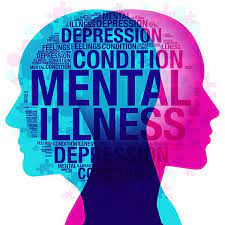Mental Illness is a complex issue that affects many people. There are many types and forms of mental illnesses. And they can be present in both adults and children.
The mental health field has made progress towards understanding the various causes of mental illness. But there is still much research to be done.
If you or someone you know suffers from any type of mental illness, it’s important to understand what’s going on. So that treatment can begin as soon as possible!
In this post, we’ll discuss some common signs and symptoms of mental illnesses, what may have caused them in the first place. We will also give ways on how best to cope with their effects on your life – all while exploring a variety of treatment options.
So stick here and read this blog post for a better understanding of mental illnesses and everything around them!
Contents
- 1 What Is Mental Illness?
- 2 Types Of Mental Illness
- 3 Signs and Symptoms of Mental Illness
- 4 Causal Factors of Mental Illness
- 5 Coping Strategies for Mental Illness
- 6 Talking To a Professional
- 7 Treatment Options for Mental Illness
- 8 Case Study
- 9 Possible Side Effects of Mental Illness Treatments
- 10 Consequences Of Untreated Mental Illness
- 11 Helping Someone With Mental Illness
- 12 Conclusion
What Is Mental Illness?
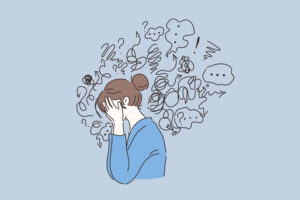
Mental illnesses are medical conditions that affect the way a person thinks, feels, behaves, and relates to others. They can range from mild to severe and disrupt a person’s ability to carry out daily activities.
However, mental illnesses are not the result of personal weakness, character flaws, or poor parenting. As a fact of the matter, they are real, serious medical conditions that should be treated by a doctor.
Types Of Mental Illness
There are many types of mental illnesses. Mental illness affects people in different ways and can develop at any age. Some examples include:

Anxiety disorders
These affect the way a person feels inside (e.g., worry, fear, or panic). Common anxiety disorders include generalized anxiety disorder, phobias, social anxiety disorder, obsessive-compulsive disorder, and post-traumatic stress disorder.
Depressive disorders
These affect the way a person feels, thinks, and behaves. Depressive disorders include major depressive disorder (clinical depression), dysthymia (mild chronic depression), and bipolar disorder (manic-depression).
Eating disorders
These are serious mental illnesses that involve abnormal eating habits. Eating disorders include anorexia nervosa, bulimia nervosa, and binge-eating disorder.
Schizophrenia
This is a serious mental illness that affects how a person thinks, feels, and behaves. Schizophrenia can cause hallucinations (seeing or hearing things that are not there), delusions (believing things that are not true), and disorganized thinking.
Signs and Symptoms of Mental Illness
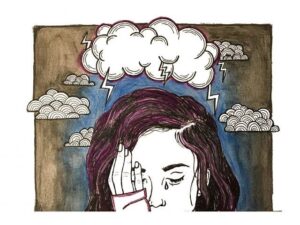
Mental illnesses can affect anyone, regardless of age, race, gender, or socioeconomic status. The signs and symptoms of mental illness vary from person to person. They can also change over time. Some common signs and symptoms of mental illness include:
- Feeling sad or down most of the time
- Having little interest or pleasure in activities you used to enjoy
- Feeling hopeless, helpless, worthless, or ashamed
- Experiencing intense anger, irritability, or frustration
- Feeling anxious or worried most of the time
- Having difficulty concentrating, remembering things, or making decisions
- Experiencing recurring thoughts or images that cause distress or anxiety
- Engaging in self-harm (e.g., cutting, burning oneself)
- having suicidal thoughts or feelings
Causal Factors of Mental Illness
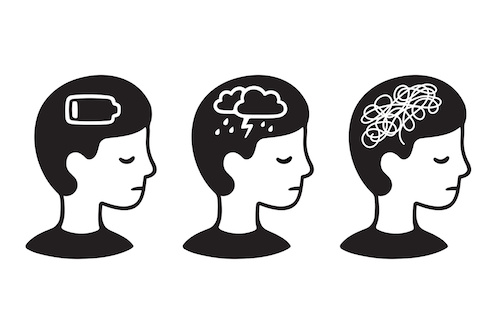
Mental illness can affect people of any age, including children. However certain factors may increase the risk for developing mental illness:
Genetics
Mental illnesses often run in families due to genetic makeup and environmental influences. Usually, more than one member of the family has a mental disorder or addiction.
Environmental Factors
Certain environmental factors may contribute to developing mental illnesses. For example, people who have experienced physical or sexual child abuse are at greater risk for depression later in life. Additionally, living in an abusive environment can increase the chances of becoming depressed and/or anxious as a child or teenager.
Brain Chemistry
As we know, the brain is a complex organ that controls how we think, feel, and behave. Thus, brain chemicals (neurotransmitters) play an important role in mental health. Now, when these chemicals are out of balance, they can lead to mental illness.
Coping Strategies for Mental Illness
One way to cope with mental illness is to recognize that you are not alone in your experience. As more than 25 percent of the world’s population will have some kind of mental health problem at some point in their lives. So, there are different ways that people can cope with their symptoms. And learn how to manage them on an ongoing basis. Some common coping strategies include:
Self-care Measures
Taking care of oneself is an important part of managing a mental illness. Some self-care measures that can be helpful include:
- Eating a balanced diet,
- Getting regular exercise,
- Getting enough sleep,
- Spending time with supportive people, and
- Taking breaks from activities or situations that are causing stress or anxiety
Getting enough sleep
Most people need around eight hours of sleep per night. As not getting enough sleep can lead to fatigue. As a result, it can worsen mental illness symptoms.
Eating healthy meals regularly
Maintaining a healthy diet is important for overall health. Therefore, eating nutritious meals can help improve mental illness symptoms.
Exercise and stress management techniques
Exercise and stress management techniques can help manage mental illness. As, it releases endorphins, which have mood-boosting effects. Also, stress management techniques such as yoga or meditation can help to calm the mind and body.
Cognitive Restructuring
It is a method in which a person identifies their harmful thoughts and then re-evaluates them in a more realistic light. Thus, it helps a person in cultivating positive thinking habits that serve their overall mental health and well-being.
Relaxation Techniques
Relaxation can be helpful for people who are experiencing anxiety, stress, anger, tension, etc. Some common relaxation techniques include:
- Meditation,
- Yoga classes/movement therapy sessions,
- Deep breathing exercises (e.g., abdominal breathing), and
- Progressive muscle relaxation
Talk to friends or family members
Friends and family members can be a great support system. They can offer practical help and emotional support.
Participate in activities you enjoy
Many different activities can help improve mental health. Such as exercise, relaxation techniques, and journaling. Apart from them, you can find the ones that work for you.
Avoiding harmful substances
Some substances can have negative effects on mental health. For example, drugs and alcohol are often linked to depression, anxiety, or psychosis. Therefore, we highly recommend you avoid their intake as far as possible.
NOTE: Talk to friends or family members about what you are going through. As friends and family members can provide practical help and emotional support.
Talking To a Professional
Mental illnesses should be treated by a doctor. That being said, there are many different types of doctors who specialize in treating mental illness. Such as psychiatrists, psychologists, and social workers.
Also, when seeking treatment from a professional, it is important to be patient and communicate all symptoms as accurately as possible. So the doctor can recommend an appropriate course of action.
NOTE: In most cases, medication will not cure mental illness but will help treat its symptoms.
Treatment Options for Mental Illness

There are many different types of treatment options available for these illnesses. The type of treatment that is best for you will depend on your individual needs and preferences. Some common treatment options include:
Therapy
Therapy is a type of treatment in which a person discusses their thoughts, feelings, and experiences with a professional. Different types of therapy can be helpful for mental illness including:
Cognitive-behavioral therapy (CBT)
A type of treatment focused on examining how negative thoughts influence behavior. This is how, CBT is effective at treating depression, anxiety disorders, eating disorders, and substance abuse.
Dialectical behavior therapy (DBT)
A type of treatment that can help individuals with borderline personality disorder learn to manage their emotions. This is how people can change their thinking habits and patterns through DBT.
Family-focused therapy (FFT)
A type of family therapy used for treating children who have experienced trauma or neglect. As a result, it helps children in speaking out and standing for themselves against abuse that may otherwise go off-record.
Group counseling sessions
Group counseling sessions can be helpful for people who feel they would benefit from social support and increased understanding of mental illness. As they find a community of people struggling with some kind of mental issues and life struggles.
Medication
Many different types of medication can be prescribed by a doctor to treat symptoms related to certain mental illnesses. Such as antidepressants or antipsychotics. Some common medications include:
Antidepressants
Medications that are primarily used to treat depression can also be helpful for people with anxiety disorders or eating disorders.
Antipsychotics
Medications typically used to treat schizophrenia and bipolar disorder help reduce the severity of psychotic symptoms. Such as delusions, hallucinations, disorganized thinking patterns (e.g., rambling), and unnaturally intense moods (i.e., mania).
Mood stabilizers
Medications typically used to treat bipolar disorder help balance the moods of a person with this type of mental illness.
Case Study
Story
A person has been feeling depressed for several weeks. They feel like they are unable to do anything that was previously enjoyable and have begun having thoughts of suicide. The individual goes to see their family doctor, who then refers them to a psychiatrist so further testing can be done.
After assessing the situation, the psychiatrist prescribes an antidepressant medication along with CBT to help manage the symptoms of depression. The individual does not respond very well to either medication or therapy and still feels depressed. After three months, a new psychiatrist assesses their situation and recommends trying an antipsychotic instead of an antidepressant.
The person agrees because they have been feeling hopeless about finding a treatment option that works for them. After a month, the person starts to feel much better and no longer feels depressed or anxious. They can go back to work and resume their social life again. The following week they find out that they are pregnant with their first child…
Analysis
This is an example of how mental illness can be treated through various types of therapy and medications. The individual may have responded better to one medication or type of treatment than another. But it is impossible to know without testing out the different options first. Using this example, you can see how mental illness symptoms are not always permanent conditions that cannot be treated effectively with a combination of various treatments over time.
Possible Side Effects of Mental Illness Treatments
When seeking treatment for mental illness, it is important to be patient and communicate all symptoms as accurately as possible. So the doctor can get the true picture and recommend an appropriate course of action.
However, in some cases, medication will not cure these illnesses but can help treat their symptoms. Also, some possible side effects from taking some types of medication include weight gain, drowsiness, and sexual dysfunction.
NOTE: It is important to discuss all potential side effects with a doctor before starting medication.
Consequences Of Untreated Mental Illness
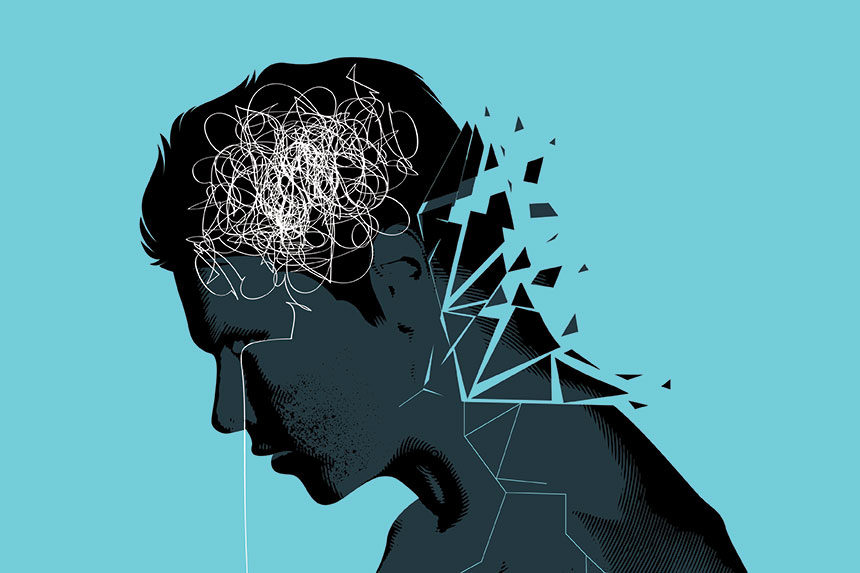
People with mental illness may experience several consequences if their symptoms are not treated. For example, people who suffer from depression and do not receive treatment can develop:
Relationship problems
Untreated depression can cause significant strain on relationships. Because the individual tends to withdraw or feel negative towards others. As a result, this behavior leads to increased interpersonal conflict that many find difficult to resolve.
Self-harm or suicide ideation
People with untreated mental illness are at an increased risk for self-harm (e.g., cutting, overdosing on medication) or suicidal thoughts and behavior.
Addiction
Mental illnesses like depression can lead to abuse of alcohol and other substances. It may worsen mental illness symptoms or cause new problems.
Inability to access healthcare services
Untreated mental illness can prevent a person from being able to access effective and affordable health care. It is due to stigma surrounding the disease, lack of knowledge about where one can receive treatment, or difficulty affording medical expenses.
Inability to access educational opportunities
Untreated mental illness can prevent a person from being able to access effective and affordable education. It is due to stigma surrounding the disease, lack of knowledge about where one can receive treatment, or difficulty affording educational expenses.
Job problems
Mental illnesses like depression can lead to decreased productivity and engagement in work. Thus, it may result in job loss or demotion.
Unemployment
People with untreated mental illness are at an increased risk for unemployment or underemployment. As a result, it can lead to poverty and economic instability.
Increased risk of homelessness and incarceration
Again, people with untreated mental illness are at an increased risk for homelessness or unstable housing. In addition, they may also be at a greater risk for incarceration due to behaviors that result from the disease (e.g., shoplifting, trespassing).
Helping Someone With Mental Illness
If you know someone who is struggling with mental illness, there are ways that you can help.
- First and foremost, be supportive and understanding. So, try not to judge or criticize the person, as this can further aggravate their symptoms.
- Second, provide resources and information about where to seek treatment.
- Third, offer practical assistance such as transportation, childcare, or household tasks.
- Finally, encourage the person with mental illness to seek professional help. And let them know that you are there for support throughout their treatment journey.
Conclusion
People who suffer from mental illness can lead normal, healthy lives when they receive the appropriate treatment. As, by understanding the different types of mental illness, their symptoms, and available treatment options, we can work together to improve the quality of life.
If you are looking for affordable Online Counseling MantraCare can help: Book a trial therapy session
